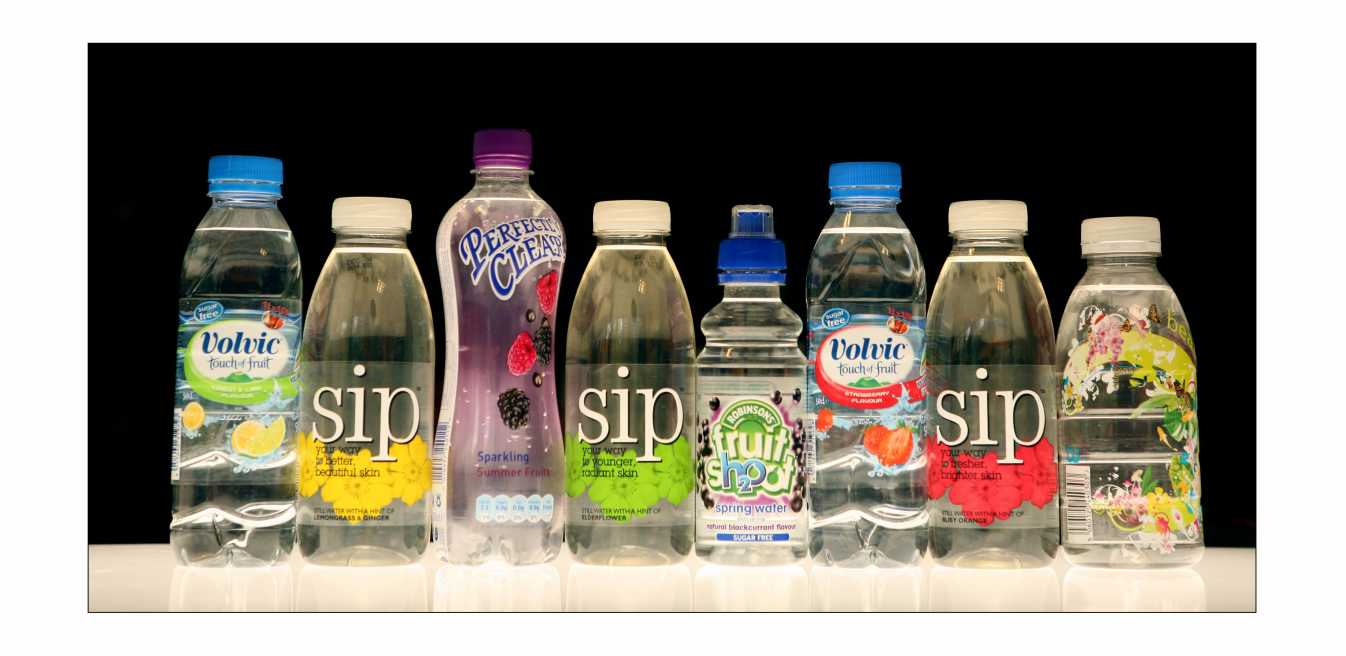Pure hype: flavoured waters
Touted as a healthier alternative to fizzy drinks are they really any better for us than a can of cola? Esther Walker investigates

Ever since the experts told us to drink more water, we've been trying to find ways around it. To get the requisite eight, eight-ounce glasses of water down our necks each day, we've all turned into hamsters, nibbling at plastic bottles every five minutes.
Soft-drink companies spotted a gap in the market and started to make "flavoured waters" – water with an artificial taste added – to make the task more palatable. One of the first was Volvic, whose Touch of Fruit comes in strawberry or lemon and lime. Others followed suit, such as Robinsons' Fruit Shoots, and Perfectly Clear (made by Silver Spring). Boots the chemist and the major supermarkets have their own brands.
Now, a new breed of "super waters" has emerged. Beauty water, made by Works With Water, contains a milk protein, Praventin, which the makers claim prevents spots. Skinny Water, made by an American company, Bio-Synergy, and sold through Superdrug, is marketed as a "flavoured fitness water"; it claims to increase fat-burning and reduce sugar cravings due to the L-carnitine and chromium it contains.
These flavoured waters aren't cheap. They range from about 65p for a bottle of Perfectly Clear to about £1.29 for a bottle of Sip.
But who buys them? They generally taste pretty revolting. And, says Gordon MacMillan, editor of Brand Republic, the sector isn't doing very well. "I bought a strawberry-flavoured water by accident, and it was disgusting. I think that explains why this sector isn't really happening. The market is very crowded because everyone's experimenting to try to find that killer brand that really takes off. But so far they haven't come up with anything that really works."
Sip was invented by Kate Shapland, beauty editor of the Daily Telegraph Magazine, "to make it easier, more delicious and exciting to drink your daily quota of water". It comes in lemongrass and ginger, elderflower and ruby orange flavours, all with a strange milky aftertaste. Sip contains no artificial sweeteners, such as aspartame, but contains "natural fruit extracts... enhanced with vitamin C, minerals, antioxidants and botanical extracts".
And Sip does best on taste. Volvic's lemon and lime Touch of Fruit smells to me like something you might use to clean the sink, and coated my tongue; Robinsons' Fruit Shoot in blackcurrant and Beauty water both seem to have the tang of bubblegum.
Flavoured waters clearly aim to appeal to consumers wanting something pure and clean. Yet most are anything but. And, although many are sugar-free, they still contain calories; Beauty has five, Touch of Fruit has seven and Sip (which has no artificial sweeteners) a whopping 95.
Sugar-free waters are often sweetened with aspartame – and many use the preservative sodium benzoate. Aspartame is 180 times sweeter than sugar, but has few calories. Sodium benzoate has long been used in soft drinks, pickles and condiments to prevent mould. The Food Standards Agency still supports its use despite Sheffield University's findings last year showing that sodium benzoate could cause damage to DNA.
If you can stomach the aspartame and sodium benzoate, the acid will go to town on your teeth. Damien Walmsley, a scientific adviser to the British Dental Association, says acidity is as significant in dental health as sugar. "The big problem with them is looking for the acidity. Often the label doesn't tell you, so it's very difficult to work out how acidic these drinks are. It's a bit of a hidden menace and I think manufacturers ought to be a bit more responsible [about labelling]."
Walmsley advises that the way to minimise the risk of damage to your teeth from flavoured waters is to drink them chilled, at meal times, through a straw and to avoid lemon or lemon and lime.
Lisa Miles of the British Nutrition Association says that, if you're thirsty, there's probably little difference in hydration terms between flavoured waters and a fizzy drink. "It's just a question of comparing the other ingredients in each – such as sugar."
So what should we do? In April, two American scientists – Dr Dan Negoianu and Dr Stanley Goldfarb of the Renal, Electrolyte and Hypertension Division at the University of Pennsylvania – concluded that there was no significant benefit to drinking quite so much water. And most of us take in a large part of our daily quota in foods and in tea and coffee.
Laura Williams, a diet and fitness specialist, agrees: "I think people tend to go a bit overboard with water – they think flavoured waters will contribute to upping their daily intake. I struggle to understand flavoured waters. What's wrong with ordinary water? How much do you need to dress things up?"
Join our commenting forum
Join thought-provoking conversations, follow other Independent readers and see their replies
Comments
Bookmark popover
Removed from bookmarks